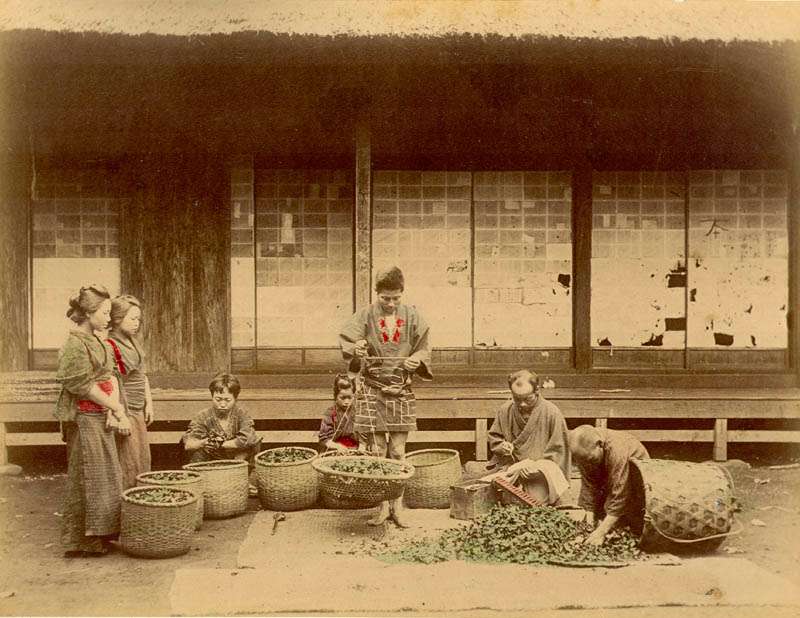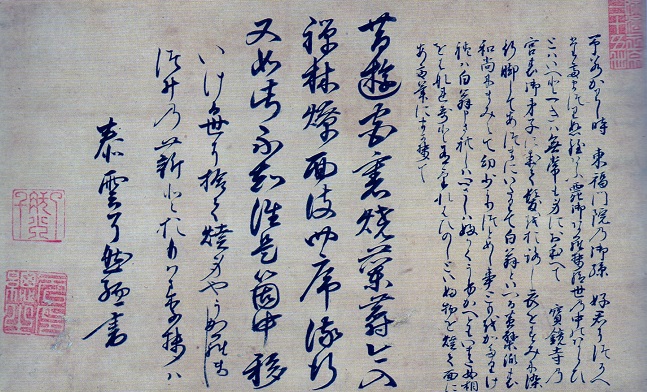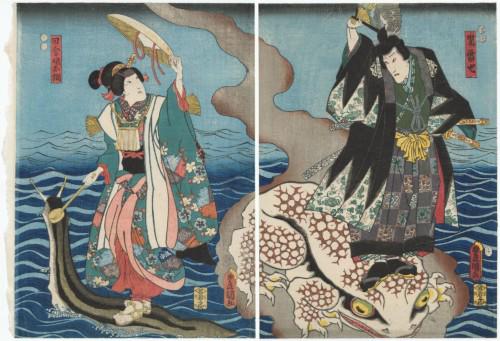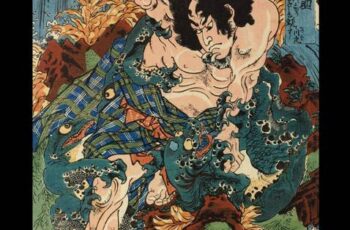
Proverbs and folklore preserve the wisdom and hard-learned lessons of the common class. Both pass down orally, taking on regional flavors over time until someone comes along and writes them down. Proverbs, because of their pithiness and use of metaphor, tend to remain in regular speech long after folktales become literature. Sometimes proverbs become folded into superstition sayings, such as “See a pin, pick it up, and all day have good luck.” On the surface this seems silly. After all, picking up a penny–and earlier a pin–seems to have little wisdom behind it. However, if you pick up enough pennies and coins, you end up with a surprising amount of money over time. The saying points toward frugality and practicality. The wisdom of picking up a pin keeps you from stepping on one. In an age before antibiotics, stepping on a pin could escalate into a major infection. When you pick up a pin, you avoid bad luck.
When it comes to Japanese proverbs, you find a mix of Chinese imports along with remnants of Ainu and possibly even Jomon oral traditions. Japanese proverbs tend to be more indirect than proverbs the West has. Often, Japanese proverbs state an image without showing any sort of action or providing any reasoning behind it. If we take our pin/penny good luck proverb, we’d end up with “See a pin” or “See a penny.” Without the cultural context, such a reduced proverb lacks meaning. However, these reduced statements become far easier to remember and to remind yourself to follow.
For example, I’m fond of these saying by Epictetus:
Some things are within our power, while others are not. Within our power are opinion, motivation, desire, aversion, and, in a word, whatever is of our own doing; not within our power are our body, our property, reputation, office, and, in a word, whatever is not of our own doing.
If I’m in a frustrating moment, it’s difficult to recite this quote to remind myself of what I can control. However, if I reduce the quote to a proverb like “Only your own doing” I can trigger the wisdom behind the quote within that moment without the extra mental overhead. During difficult moments, we often don’t have the overhead necessary to pull up a long quote, but these pithy images take fewer mental resources. Not all Japanese proverbs fall into this reduction however.
Let’s look at several Japanese proverbs that remain useful for modern life. I’ll provide an explanation for each.
When wild geese soar overhead even terrapins stamp their feet on the ground.
The success of others should inspire you to do the best you can within your circumstances instead of becoming envious of that success. Turtles know they can’t fly, but they can still succeed in their own way. The key is to accept your limitations, stretching them as you can, without comparing yourself to others.
A jewel will not sparkle unless polished.
To reach your full potential, you have to educate yourself and develop your skills. No matter how good your talent is, it needs polished to reach its potential. Polishing a jewel takes a high level of skill, persistence, and time to make it valuable–remember, this proverb comes from a time when people polished gems by hand. Improving yourself until you sparkle takes even more skill, persistence, and patience.
A high-crawling dragon repents.
Pride causes people all sorts of problems, and unlike a wise dragon, prideful people often don’t change. This proverb serves to warn against being arrogant and pointing to how wisdom requires changing your behavior if you are prideful. According to legend, persistent carp which swim up certain waterfalls can transform into dragons. The immense effort to achieve this can then fill the new dragon to take too much pride in its rare achievement. So it is with the rare people who are able to swim up their own waterfalls to become dragons. The next step is to be humble and to go back to serve the other carp attempting the same feat.
Two wet swallows under one umbrella.
Anime umbrella scenes pull from this and other proverbs. The proverb invokes the idea of sharing both the good (the dryness of the umbrella) and the bad (already soaked from the rain or getting your shoulder, or in the case, wing wet because you are sharing the umbrella). When two people walk together under an umbrella, they have to match each other’s pace and enter each other’s personal space. The image is quite beautiful and encapsulates a healthy relationship.
To blow the hair and get a wound.
This obscure saying means “to bring misfortune by paying too much attention to another person’s faults.” Think of the proverb with this illustration. You trip and fall onto a sharp rock because you are too busy watching someone’s hair get mussed by the wind and thinking about how terrible it makes them look. This proverb tells us not to judge others nor to think ourselves as superior to others. After all, everyone’s hair–if you have hair!–blows in the wind.
Not the slightest dirt under the nails.
On its face this proverb appears to be a cleanliness lesson. Make sure there isn’t a bit of dirt under your nails. But this proverb is actually saying “don’t be dishonest in what you say or do.” Dishonesty tarnishes character. Even a small lie can ruin character just as a little dirt under the nails can ruin a person’s cleanliness. The proverb points to how details in your speech and actions matter. You may be pristine and dressed in expensive clothes, but dirt under your fingernails stands out even more. A single lie stands out if you are an honest person.
Shooting a gun on a dark night.
This warns us against doing something dangerous without a goal or end in mind. Acting blindly can not only hurt others, but also yourself. The effect may be spectacular. A black-powder gun can look like a firework in the dark. You don’t know where the bullet is going, and the gun itself may explode in your hands if you loaded it wrong. Our actions run the same risks when they are not illuminated by planning and thoughtfulness. The shooting spectacle serves no purpose and wastes resources. So too acting impulsively.
An unskillful person inspects his tools.
Unskillful people focus on their tools–believing the quality of the tools determines the quality of the work. While this is a factor, skillfulness allows a maker to still create something of quality even with poor tools. We’ve all been guilty of this: when starting something new, we focus on getting the best clothes, tools, books, and so on at the outset instead of focusing on developing the fundamental skills first. Basic, but serviceable tools, are all you need to start a task. Unskillful people run the risk of relying too much on tools to the point where they don’t develop their skills. This also applies to the tools of the mind.
Candles exhaust themselves to give light.
Great people unselfishly devote themselves to benefiting the welfare of others. A candle, by its nature, gives light when lit. A virtuous person, by their nature, benefits others without trying. The trick is cultivating yourself so seeking the welfare of others becomes automatic.
To pile up merit by fireflies and snow.
Be dedicated to your own education, so dedicated that you study by the light of fireflies and by the reflected starlight on the snow. The proverb points to not allowing poverty to stop your self-development or use other excuses to avoid learning, such as not having enough time. Fireflies and snow cost nothing to observe and appreciate. Education itself doesn’t require you to pay for college or otherwise degree chase. You can become educated by observing the world and reading books.
Proverbs serve as reminders for what people already know (or should know) to do. And Japanese proverbs can stand out in memory because of their unusual images. The fireflies and snow proverb is one I use to remind myself not to be lazy or slack on my projects and readings.
Do you have any Japanese proverbs that you use as reminders?
References
Buchanan, Daniel Crump (1965) Japanese Proverbs and Sayings. University of Oklahoma Press.






Japanese is full of short “iinarariwashi” sayings, most of which are idioms, some of which are proverbs. But just as important, I think, is that they can carry with them deep or complex feelings. Regardless, I sometimes wonder if the gradual disappearance of a familiarity of cultural meanings will rob them of their significance.
I recently used, “鯉の滝登り” (“Koi no taki nobori”, “a carp’s waterfall climbing”) to describe my feelings and assessment of someone whom I thought had engaged in an extraordinarily admirable act of perseverance, but as applied to a task that was obviously doomed to futility.
Many four-kanji compound “Yojijukugo” are also idiomatic. And many of these brief Japanese expressions of either type can be deeply moving to those who understand their meanings, even if they aren’t proverbs…
会者定離 “eshajōri”, to come together is to part.
花鳥風月 “kachōfūgetsu”, flower, birds, wind, moon… each season its own beauty.
一期一会 “ichigoichie”, one lifetime, one meeting… a moment to cherish.
恋の予感 “koinoyokan”, love’s premonition.
鏡花水月 “kyouka suigetsu”, mirror-flowers water-moon, unattainable distant beauty.
金繕い “kintsukuroi”, golden repair… the beauty of that broken.
木漏れ日 “komorebi”, sunlight filtered through leaves… flickers of beauty in shadows.
水に流す “mizuninagasu”, water flows… life goes on regardless.
Thanks for sharing those sayings! It’s sad that idioms and proverbs lose their deeper meanings. “Knock on wood” or “touch wood,” for instance, is often used humorously, but it actually has deeper roots in Germanic beliefs and rituals. You make an excellent point about how idioms and proverbs can convey emotions. The references and images are rich. Considering most of us consume more advertising copy and jingles than proverbs and poetry, I suspect we’ve lost (or are losing) the language and images necessary to connect over the deeper human experience. What do you think?
木漏れ日, komorebi, is one of my favorite experiences/feelings when I’m out hiking, especially during autumn as the leaves fall and winter with the cool violet-blue shadows snow-covered trees cast. Calm and bittersweet, ethereal and unique. frozen and fleeting.
You picked a good one, with a very deep cultural significance. It’s a very existential statement about the nature of life and where we choose to focus our attentions. You can search that expression (in kanji) on my site and see how I used it to describe just what you observe in something that has absolutely nothing to do with sunlight.